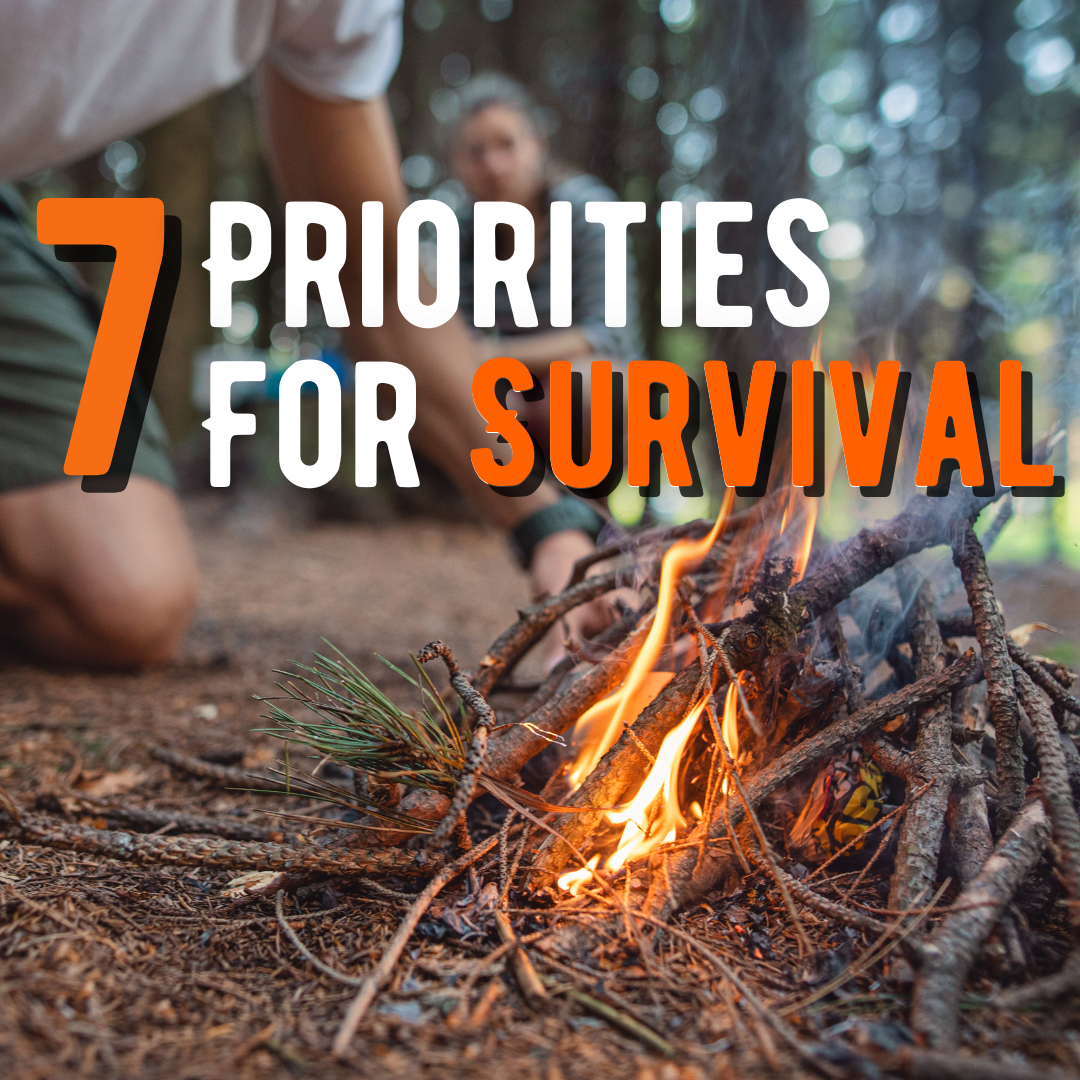
7 Survival Priorites

Do you know the first thing on your to-do list when you find yourself in some sort of survival situation? Most Americans believe that they could survive up to 2 weeks in the wild when faced with some sort of life or death situation, but the reality is, only a fraction of these people can even start a fire. Although many may think they have the right idea when it comes to proper survival priorities, it's never a bad idea for a quick review to make sure you are mentally and physically ready to endure the elements and survive. Here are 7 priorities that should be at the top of your list.
1. STOP - Stop, Think, Observe, Plan
This widely used survival tip is the first priority on your list that will help you get a bit more organized so you can be ready to face what might be ahead. First, we need to stop, and analyze our surroundings as well as the situation we've been presented with. Don't panic at this stage as this may be your first natural reaction. Once your in a clear head space about what may just have taken place, now is the time to think. Determine your next steps for dealing with whatever has come your way. You may be thinking about what you can do about your environment or you may be thinking about finding a shelter. Whatever it is you plan on doing next, make sure it makes sense and is the most logical in the midst of the chaos. Now start to observe. Is there someone around you that needs help? Is there a fire that needs to be put out. Use the previous steps to remain calm and cool so you can make the best possible decision. And lastly, plan your next move. You've observed your surroundings, and thought things through. Now it's time to put your thoughts into actions so you can determine the best plan for survival.
2. First Aid
After you've had a chance to clear you head, now you need to determine who needs immediate help. It may even be you that needs assistance. If it's a serious injury, that will need immediate attention first, but it's important to give attention to injuries that may not be on the surface as well. Making sure you and your crew are hydrated and are still mentally stable is also an important part of first aid. If a tramatic event just took place, it's important to check in on all people you are with to make sure they are mentally and physically able to keep moving forward. Your group's morale is an important part of making it to safety so just be sure to keep that in mind.
3. Shelter
When you've been displaced from your home or are hiding out in the wilderness, shelter is one of your ultimate friends. Shelter will provide some safety away from the elements and will provide some warmth and protection. When creating your shelter, you will want to make sure it can hold up to all kinds of weather. Try to keep it out of the wind and rain if possible, and keep it compact and insulated so you can share body warmth. There are tons of ways to build a sturdy shelter, but don't wait until your stuck in a survival situation to equip yourself with the abilities to make one. You're definitely going to need a solid base for you and anyone else you are with.
4. Fire
Shelters are great for providing some warmth, but you will need the power of a fire to keep dry and warm for how ever many days may be ahead. Not only that, but a fire also provides a way to cook food, boil water, and provide some morale to any group that likely had a long day in the wilderness. You'll need to gather some dry, dead wood for best results, and you need to make sure you have plenty of it. There's no point in gathering enough wood to get the fire started only to run out a couple of hours later. Make fire a priority by having plenty of fire-starting methods ready to go in your survival bag. Not having reliable fire starters is a huge mistake that some preppers might make. Be sure you are not one of these people and make sure you are well-prepped.
5. Signaling
Signaling is a huge priority for survival and can be the difference in attempting to survive for 2 days, and 2 months. A good signal lets other people know that you are in serious trouble, or need assistance or rescue. A fire or S.O.S. signal are a couple of the more traditional method of signaling, but remember that technology is your friend and should be utilized as well. A cellphone can be used to call the police or nearest authority, but cellphones are not always the most reliable in terms of getting a signal. Even if you are able to send or receive a call, ensure you have a reliable radio in your repertoire, like the 878UVII Plus to send a signals to friends or authorities in a dire situation. With features like GPS, and APRS receive and transmit, a good-quality radio provides alternative options to beacon your location or let someone know of your coordinates. Keep traditional signaling methods like smoke signals, fires, loud noises in mind, but remember to use technology if it can safely and reliably be used.
6. Water
As most of us know, you can live 1 or 2 weeks without food, but water is something that you won't last more than a few days without. Dehydration is one of your main enemies in the wild so it's really important that you stay hydrated with plenty of water if at all possible. Many pools of water are filled with bacteria that can cause harm and bring about illnesses to us or our entire group. Boiling water is a great way to kill off a lot of these harmful bacteria before they can effect us in any way.
If you are looking for water to drink in the wild:
-Try to make sure it is clear
-Try to get it from a stream as opposed to a stand-still pool of water
-Don't drink it if it has a funky smell
One important thing to think about here as well is making sure your effort is worth it. Don't hike up a small mountain to obtain a small amount of water. The sweat you will have lost will not equal the amount of water you obtain. Put your effort and sweat only into things that give you a bigger payoff, as your hydration is one of your most important assets in this type of situation.
7. Food
Food is at the bottom of this list, which may surprise some of you. The reason being is one I briefly mentioned before. You can survive up to weeks without food! Several sources state you can live from two to four weeks without any sort of food which is why this priority finds itself at the bottom. When you are first thrusted into this type is survival situation, it is much more important to focus your energy on priorities one through six rather than trying to secure a food source. It may be uncomfortable, and it may make you feel week at times, but remember that the body has plenty of stored resources and energy that can keep you going while you aren't consuming food on a day-to-day basis. Your energy is better spent elsewhere for the first couple weeks of survival, so don't panic if food can't be found at the beginning stages.
Now that your survival to-do list has been completed for you, it's time to make sure your priorities are in check so when any natural disaster or survival situation comes your way, you're ready to face it head on. Make a plan, think through these seven priorities, and you will have a clear escape to a situation that others may not be able to avoid.






